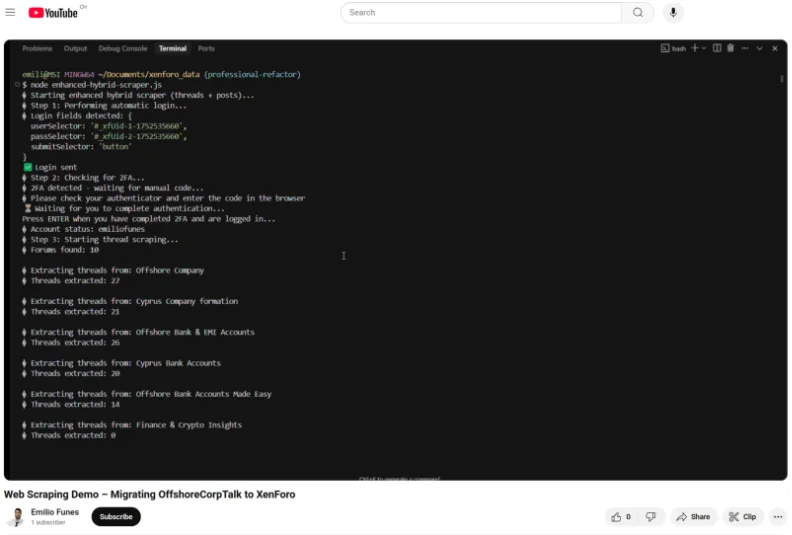A recent video demonstration showing how content from an international finance forum could be scraped has sparked debate over data security and the risks of open online communities. The incident highlights how easily information shared in niche platforms can be harvested and repurposed, raising questions for businesses, regulators, and users alike.
Screenshot: Demo video showing automated scraping of forum content
What Happened
The video, posted on YouTube, demonstrated how a scraper tool could log in, navigate categories, and extract threads in bulk from OffshoreCorpTalk (OCT), a long-running forum where entrepreneurs and professionals discuss offshore banking, company formation, and compliance. The tool was able to bypass standard barriers and copy large volumes of content in minutes. Although presented as a technical exercise, the demonstration shows the vulnerability of online platforms that host sensitive discussions.
Why It Matters
OCT has become a resource for those navigating complex financial systems, including offshore structures, taxation, and banking. Such discussions, while openly available to registered users, are not intended for mass harvesting. Scraping turns a community knowledge base into a dataset that can be mined, repackaged, and even sold. This raises concerns for both the integrity of the forum and the privacy of its participants.
Business Risks
For companies, the danger lies in sensitive insights being extracted and reused out of context. Competitors could gain intelligence on strategies, while regulators or investigators might misinterpret informal discussions. For small businesses already struggling with global banking restrictions, the added risk of exposure may discourage them from engaging in online communities altogether.
Legal and Ethical Questions
Web scraping itself is not always illegal. Search engines and research projects rely on it. But when scraping bypasses authentication or targets semi-private platforms, it enters a grey area. Courts in different jurisdictions have issued mixed rulings. Legal experts note that scraping behind login walls can be considered unauthorized access, and in some countries may violate IT or privacy laws.
Beyond legality, there are ethical concerns. Forum members contribute knowledge in the spirit of community. They rarely expect their posts to be vacuumed up and repurposed at scale. Such practices undermine trust and could reduce the willingness of people to share openly online.
Conclusion
The scraping of OCT may seem like a small incident, but it reflects a broader challenge in today’s digital economy. As data becomes more valuable, the line between open knowledge-sharing and exploitation grows thinner. Communities, businesses, and regulators will need to grapple with how to protect valuable exchanges without stifling them. For now, the lesson is clear: even in seemingly closed spaces, what is shared online may be more exposed than it appears.

